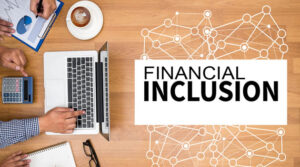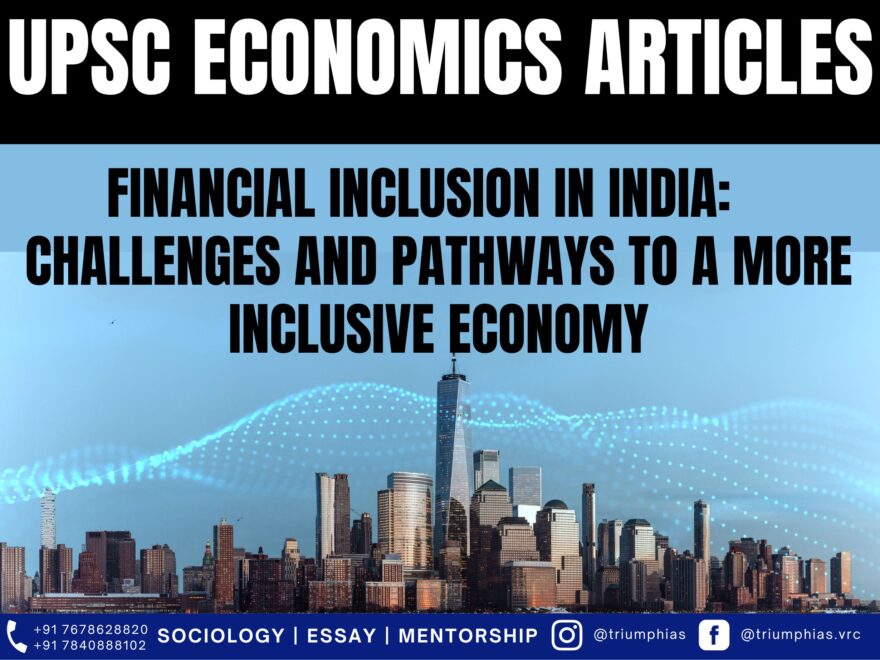Financial Inclusion
(Relevant for Economics Section of General Studies Paper Prelims/Mains)

Financial inclusion
Financial Inclusion, in its broadest sense, pertains to ensuring comprehensive availability of an extensive array of financial services at affordable rates. This encompasses not only banking offerings but also extends to various other financial amenities such as insurance and equity products.
- Enhance Savings: The expansion of financial inclusion cultivates a savings-oriented mindset among extensive rural populations, augmenting the financial system’s resource foundation. This, in turn, contributes to the economic development process. Additionally, by encompassing low-income groups within the formal banking sector, financial inclusion safeguards their financial assets and resources during critical situations. Furthermore, financial inclusion serves to counteract the exploitative practices of predatory moneylenders, offering convenient access to formal credit.
- Multiplier Impact on Economic Growth: Increasing evidence underscores the multiplier impact of financial inclusion in elevating overall economic productivity, diminishing national poverty rates, and alleviating income disparities.
- Advocate Gender Equality: Gender equality and women’s economic empowerment are profoundly advanced through the financial inclusion of women. Granting women greater command over their financial affairs empowers them to uplift themselves and their families from poverty, reduce vulnerability to economic hardships, eradicate exploitation in informal sectors, and amplify their capacity to participate effectively in meaningful and productive economic endeavours.
- Lack of Universal Access to Banking Services Bank accounts serve as entry points to a spectrum of financial services. However, as outlined in a 2021 World Bank report, approximately 190 million adults in India remain without a bank account, positioning India as the second-largest country globally in terms of its unbanked populace, trailing only China.
- Digital Disparity The adoption of digital technology, which could drive financial inclusion, encounters several prevalent obstacles, including:
- Absence of appropriate financial products
- Limited proficiency among stakeholders in utilizing digital services, Infrastructural limitations
- Financial constraints among low-income consumers impeding their access to requisite technology for digital service utilization.
- Influence of an Informal, Cash-Centric Economy India predominantly operates as a cash-driven economy, a characteristic that hampers the widespread acceptance of digital payments.
- Moreover, the International Labour Organization (ILO) reports that a significant 81% of India’s employed population engages in informal sector work.
- This amalgamation of a substantial informal sector and a strong reliance on cash transactions forms a notable barrier to digital financial inclusion.
- Gender Disparity in Financial Access According to the 2017 Global Findex database, while 83% of males above 15 years old held financial institution accounts in India, only 77% of females did so in the same year.
- This discrepancy is attributed to socio-economic factors, including the higher prevalence of mobile handsets and internet data access among men compared to women.
Ways to improve financial inclusion
- Broaden Digital Reach: To attain the goal of ensuring widespread availability of financial services, it is imperative to establish a resilient and efficient digital network infrastructure encompassing all financial service touch points. This will facilitate seamless delivery of financial services.
- Moreover, it is advisable to extend the digital financial framework to encompass co-operative banks, specialized banks (such as Payments Banks and Small Finance Banks), and other non-banking entities such as fertilizer shops, as well as the Offices of Local Government bodies and Panchayats. This extension aims to enhance efficiency and transparency in the services provided to customers.
- Amplify Banking Outreach: The expansion of banking outlets from Scheduled Commercial Banks, Payments Banks, and Small Finance Banks is vital in ensuring that banking access reaches every village.
- Harnessing Fin-Tech Innovation: The progress in the realm of financial technology (fin-tech) can be leveraged to encourage financial service providers to adopt inventive strategies for bolstering their outreach.
- Universal Financial Accessibility: To achieve universal access to financial services, the digital infrastructure within the country necessitates augmentation through improved networking of bank branches, Micro ATMs, Point of Sale (PoS) terminals, and reliable connectivity, among other measures.
To master these intricacies and fare well in the Sociology Optional Syllabus, aspiring sociologists might benefit from guidance by the Best Sociology Optional Teacher and participation in the Best Sociology Optional Coaching. These avenues provide comprehensive assistance, ensuring a solid understanding of sociology’s diverse methodologies and techniques.
Financial Inclusion, Economic Growth, Gender Equality, Digital Disparity, Banking Access, Financial Services, Digital Technology, Fin-Tech Innovation, Economic Development, Savings, Financial Inclusion, Economic Growth, Gender Equality, Digital Disparity, Banking Access, Financial Services, Digital Technology, Fin-Tech Innovation, Economic Development, Savings, Best Sociology Optional Coaching, Sociology Optional Syllabus.
Sample Question for UPSC Sociology Optional Paper:
- What does financial inclusion entail?
Answer: It refers to ensuring comprehensive availability of a wide range of financial services at affordable rates, including banking, insurance, and equity products. - How does financial inclusion contribute to savings and economic development?
Answer: It cultivates a savings-oriented mindset among rural populations and offers a safeguard against predatory lending, thereby contributing to economic development. - What is the ‘Multiplier Impact on Economic Growth’?
Answer: Financial inclusion has a cascading effect on overall economic productivity, reducing national poverty rates and alleviating income disparities. - How does financial inclusion advance gender equality?
Answer: By giving women more control over their financial affairs, it empowers them to uplift their families from poverty, reduce vulnerability to economic hardships, and participate effectively in the economy. - What challenges does India face in achieving universal financial inclusion?
Answer: Lack of universal access to banking, digital disparity, prevalence of an informal, cash-centric economy, and gender disparity in financial access. - What solutions does the blog propose to improve financial inclusion?
Answer: Broadening digital reach, expanding banking outlets, harnessing fin-tech innovations, and improving the digital infrastructure within the country. - Why is a resilient digital network infrastructure necessary for financial inclusion?Answer: It facilitates the seamless delivery of financial services, including those from non-traditional providers like co-operative banks, Payments Banks, and local government bodies.
- What role do Scheduled Commercial Banks, Payments Banks, and Small Finance Banks play in amplifying banking outreach?
Answer: Their expansion ensures that banking access reaches every village, promoting financial inclusion. - How can fin-tech innovation be harnessed for financial inclusion?
Answer: By encouraging financial service providers to adopt inventive strategies that extend their reach and service offerings.

Choose The Best Sociology Optional Teacher for IAS Preparation?
At the beginning of the journey for Civil Services Examination preparation, many students face a pivotal decision – selecting their optional subject. Questions such as “which optional subject is the best?” and “which optional subject is the most scoring?” frequently come to mind. Choosing the right optional subject, like choosing the best sociology optional teacher, is a subjective yet vital step that requires a thoughtful decision based on facts. A misstep in this crucial decision can indeed prove disastrous.
Ever since the exam pattern was revamped in 2013, the UPSC has eliminated the need for a second optional subject. Now, candidates have to choose only one optional subject for the UPSC Mains, which has two papers of 250 marks each. One of the compelling choices for many has been the sociology optional. However, it’s strongly advised to decide on your optional subject for mains well ahead of time to get sufficient time to complete the syllabus. After all, most students score similarly in General Studies Papers; it’s the score in the optional subject & essay that contributes significantly to the final selection.
“A sound strategy does not rely solely on the popular
Opinion of toppers or famous YouTubers cum teachers.”
It requires understanding one’s ability, interest, and the relevance of the subject, not just for the exam but also for life in general. Hence, when selecting the best sociology teacher, one must consider the usefulness of sociology optional coaching in General Studies, Essay, and Personality Test.
The choice of the optional subject should be based on objective criteria, such as the nature, scope, and size of the syllabus, uniformity and stability in the question pattern, relevance of the syllabic content in daily life in society, and the availability of study material and guidance. For example, choosing the best sociology optional coaching can ensure access to top-quality study materials and experienced teachers. Always remember, the approach of the UPSC optional subject differs from your academic studies of subjects. Therefore, before settling for sociology optional, you need to analyze the syllabus, previous years’ pattern, subject requirements (be it ideal, visionary, numerical, conceptual theoretical), and your comfort level with the subject.
This decision marks a critical point in your UPSC – CSE journey, potentially determining your success in a career in IAS/Civil Services. Therefore, it’s crucial to choose wisely, whether it’s the optional subject or the best sociology optional teacher. Always base your decision on accurate facts, and never let your emotional biases guide your choices. After all, the search for the best sociology optional coaching is about finding the perfect fit for your unique academic needs and aspirations.
To master these intricacies and fare well in the Sociology Optional Syllabus, aspiring sociologists might benefit from guidance by the Best Sociology Optional Teacher and participation in the Best Sociology Optional Coaching. These avenues provide comprehensive assistance, ensuring a solid understanding of sociology’s diverse methodologies and techniques. Sociology, Social theory, Best Sociology Optional Teacher, Best Sociology Optional Coaching, Sociology Optional Syllabus.
Best Sociology Optional Teacher, Sociology Syllabus, Sociology Optional, Sociology Optional Coaching, Best Sociology Optional Coaching, Best Sociology Teacher, Sociology Course, Sociology Teacher, Sociology Foundation, Sociology Foundation Course, Sociology Optional UPSC, Sociology for IAS,
Follow us :
🔎 https://www.instagram.com/triumphias
🔎https://www.youtube.com/c/TriumphIAS
https://t.me/VikashRanjanSociology
Find More Blogs
|
Scope of the subject and comparison with other social sciences |
|||
|
|
|
|
Modernity and social changes in Europe |

